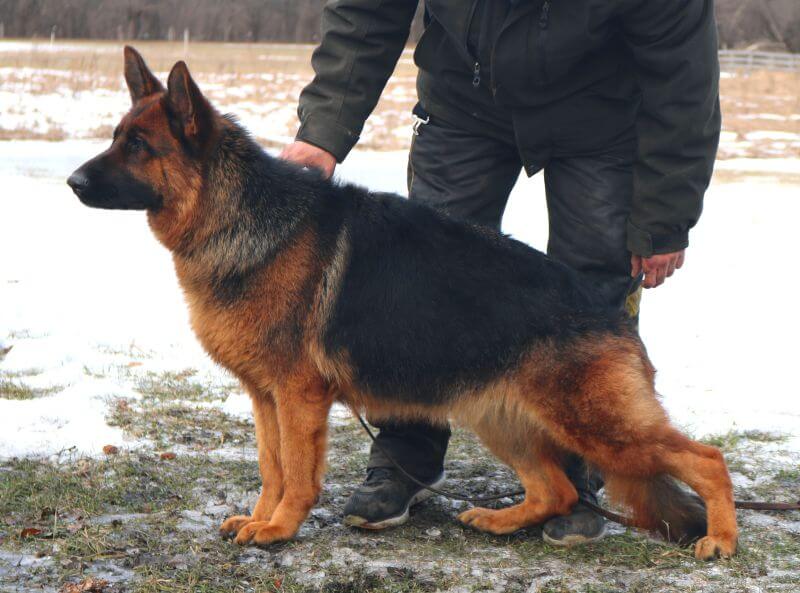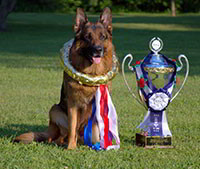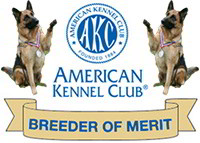German Shepherds are often celebrated for their intelligence, loyalty, and versatility. As a breed, they can serve as working dogs, guardians, and, most importantly, loving family companions. But suppose you’re considering bringing one into a home with children. In that case, it’s natural to wonder if they’ll fit seamlessly into family life.
The short answer is yes—German Shepherds can be excellent with kids when given proper care, training, and guidance. Their instincts, paired with their ability to learn and adapt, make them great protectors and playmates.
This article delves into the German Shepherd’s temperament, compatibility with kids, training methods, and safety tips. By the end, you’ll clearly understand why these incredible dogs are often the ideal choice for families with children.

Understanding The German Shepherd Temperament
Imagine a dog as sharp as a whip and as loyal as your best friend. That’s a German Shepherd. Their intelligence is unmatched, allowing them to excel in learning commands, solving problems, and adapting to new situations. This mental sharpness is one reason they are often chosen for roles like police work, search and rescue, and service dog duties.
Loyalty is another defining characteristic. Once a German Shepherd bonds with their family, they form a deep, lifelong connection. This loyalty drives their instinct to protect and care for their loved ones. Whether alerting you to a visitor at the door or following your child around the yard, their dedication to their “pack” is unwavering.
Despite their impressive size and strength, German Shepherds have a gentle and affectionate side. When properly trained, they balance their protective instincts with a calm, approachable demeanor. This combination of power and gentleness makes them suitable for family life.
However, their high energy levels require attention. German Shepherds need daily exercise and mental stimulation to stay happy and well-behaved. Without it, their intelligence and energy can lead to frustration, resulting in undesirable behaviors.
When their temperament is understood and nurtured, German Shepherds become incredible companions. This understanding sets the stage for their relationship with children, which we’ll explore next.
Assessing Compatibility With Children
Can a dog match the energy of a child while offering steadfast protection? German Shepherds manage to do both effortlessly. German Shepherds are known for their family-oriented nature, making them an excellent match for households with children. Their playful energy mirrors the natural liveliness of kids, making them ideal playmates.
One of their most endearing qualities is their protective instinct. Many German Shepherds naturally adopt the role of a guardian within the family. They often develop a watchful bond with children, subtly ensuring their safety. It’s as if they view the family’s youngest members as their special responsibility, a role they fulfill with quiet vigilance.
Their intelligence also allows them to quickly adapt to the unpredictable behavior of children. They can learn to stay calm around loud noises, sudden movements, or excited screams—common occurrences in a house with kids. They demonstrate remarkable patience and restraint when trained well, even during high-energy play.
However, it’s essential to consider their size and strength. German Shepherds can weigh 60 to 90 pounds, and in their excitement, they might unintentionally knock over a small child. This is not a sign of aggression but a result of their exuberance and energy. Supervision during play and consistent training to establish boundaries help mitigate such risks.
Introducing a German Shepherd into a home with children requires preparation on both sides. Teaching the dog to be gentle and calm while ensuring children understand how to interact respectfully is key to fostering a positive relationship.
With proper guidance and mutual respect, German Shepherds become both loyal protectors and joyful playmates. Early socialization can further enhance this compatibility, which we’ll explore next.
Importance Of Early Socialization
Think of socialization as a way to introduce the world to your puppy, one positive experience at a time. Socialization involves introducing a puppy to various people, places, sounds, and experiences in a controlled and positive way. This process helps them grow into confident, adaptable, and well-behaved adults.
Early socialization is particularly valuable for families because it allows the German Shepherd to develop a sense of familiarity and trust with children. When exposed to kids from a young age, the dog learns to see them as part of their “pack,” strengthening their bond. Positive interactions during this period lay the groundwork for a relationship built on trust and comfort.
Socialization also helps reduce the chances of fear or overprotective behavior. By exposing puppies to new environments, such as playgrounds or family gatherings, they become accustomed to the sounds and movements typical of children. The more experiences they have, the more likely they will remain calm and composed in different situations.
Rewarding your puppy for calm and friendly behavior during socialization is key. Treats, praise, and affection create positive associations with the people and experiences they encounter. This makes the process enjoyable for both the dog and the family.
Proper socialization sets the foundation for a German Shepherd’s lifelong adaptability and trust with children. Once this groundwork is laid, training techniques can further shape their behavior, ensuring positive interactions with kids. Let’s delve into those training strategies next.
Training Techniques To Foster Positive Interactions
Training is more than just teaching commands—it’s about building a language of trust and understanding with your German Shepherd. It is one of the most effective ways to ensure that German Shepherds and children coexist safely and happily. With their intelligence and eagerness to learn, German Shepherds respond exceptionally well to structured training, especially when it begins early.
Basic obedience commands such as “sit,” “stay,” “down,” and “gentle” are essential. These commands guide the dog on how to behave, particularly around children. For example, teaching the “gentle” command helps the dog understand that they must be calm and careful during interactions. It effectively prevents accidental bumps or rough play.
Jumping is a common behavior in excited dogs, but it can be dangerous around young children. Training your German Shepherd to greet people politely with all four paws on the ground is crucial. Positive reinforcement, such as praise or treats, encourages desired behaviors, making the learning process enjoyable for the dog.
Supervision is key, particularly with younger children. During playtime, monitoring interactions to ensure the dog and child understand each other’s boundaries is important. This avoids misunderstandings and creates a safe, positive environment for both.
When training is approached with consistency and positive reinforcement, German Shepherds learn to be gentle, reliable companions for children. Educating kids on proper interaction further supports this harmonious relationship, which we’ll explore in the next section.
Educating Children On Proper Dog Interaction
Friendships are built on respect, and the bond between kids and dogs is no different—it needs understanding on both sides. Teaching children how to interact with dogs is just as important as training the dog. German Shepherds are naturally loyal and protective but rely on respectful interactions to build trust. Helping kids understand how to engage with their furry friend ensures a safe and happy relationship for everyone involved.
Start by teaching children the basics of dog approach and handling. They should avoid running toward the dog, yelling, or making sudden movements, as this can confuse or startle even the calmest pup. Instead, show them how to calmly offer their hand for the dog to sniff, signaling friendliness and trust.
Explain the importance of respecting a dog’s space. Kids must understand that pulling on a tail or bothering them while eating can make the dog uncomfortable. Encourage gentle petting and praise the child when they interact respectfully.
Another key aspect is teaching children to recognize canine body language. Explain that a wagging tail doesn’t always mean happiness—it could mean excitement or nervousness.
Show them that growling or showing teeth is the dog’s way of saying, “I need some space.” By learning to interpret these signals, kids can avoid behaviors that might provoke an unwanted reaction.
Using toys during play is also a smart strategy. Encouraging children to use fetch toys or tug ropes rather than their hands minimizes the chance of accidental nipping. Supervised play sessions ensure safe, positive interactions and allow the child and the dog to build confidence.
When children are taught to respect and understand their German Shepherd, the foundation for a loving and lasting bond is set. Good interaction habits complement safety and health considerations, which we’ll dive into next.
Health & Safety Considerations
A healthy dog is a happy dog, making a safer, more harmonious family pet. Maintaining a German Shepherd’s health ensures they are ready for family life. Regular veterinary visits, vaccinations, and preventative care are non-negotiable. A healthy dog is less likely to display behavioral issues, keeping interactions with children safe and positive.
Grooming is also essential. Routine brushing, ear cleaning, and nail trimming keep your dog comfortable and prevent potential health problems. Cleanliness benefits both the dog and your family.
Always supervise interactions, particularly with younger children. Even well-trained dogs can get excited, and close monitoring prevents accidents before they happen.
By prioritizing health and safety, you create the best environment for your dog and children to thrive together. Now, let’s explore how Mittelwest German Shepherds supports families in finding the perfect match.
Mittelwest – Committed To Family-Friendly Dogs
At Mittelwest, we believe that a well-bred German Shepherd is more than a pet—they’re part of your family. We are dedicated to breeding exceptional dogs with outstanding temperaments, health, and compatibility with families. Our German Shepherds are carefully selected and raised to thrive as loving companions and protectors.

We begin early socialization to prepare puppies for a range of environments, ensuring they are adaptable and well-mannered. This foundation makes them ideal for families, including those with children. Additionally, our breeding practices emphasize mental and physical health, giving you a dog as sound as it is in strength.
Our training programs help families and their new Shepherds develop a strong bond. From basic obedience to advanced techniques, we provide guidance tailored to your needs. With Mittelwest, you gain a dog and a trusted family member.
Choosing a Mittelwest German Shepherd means investing in a loyal, intelligent, family-ready companion. If you’re looking for a devoted companion, there’s no better choice than a Mittelwest German Shepherd.
Summary
German Shepherds are an excellent choice for families with children. Their intelligence, loyalty, and protective nature make them loving companions and capable guardians. With proper care, training, and respect, they adapt wonderfully to family life.
Early socialization and consistent training are key to fostering a safe and happy relationship between dogs and children. Equally important is teaching children to interact respectfully, creating a bond built on mutual trust and love.
Mittelwest German Shepherds provides the perfect foundation for this journey. Our carefully bred and trained dogs are ready to become cherished members of your family.












